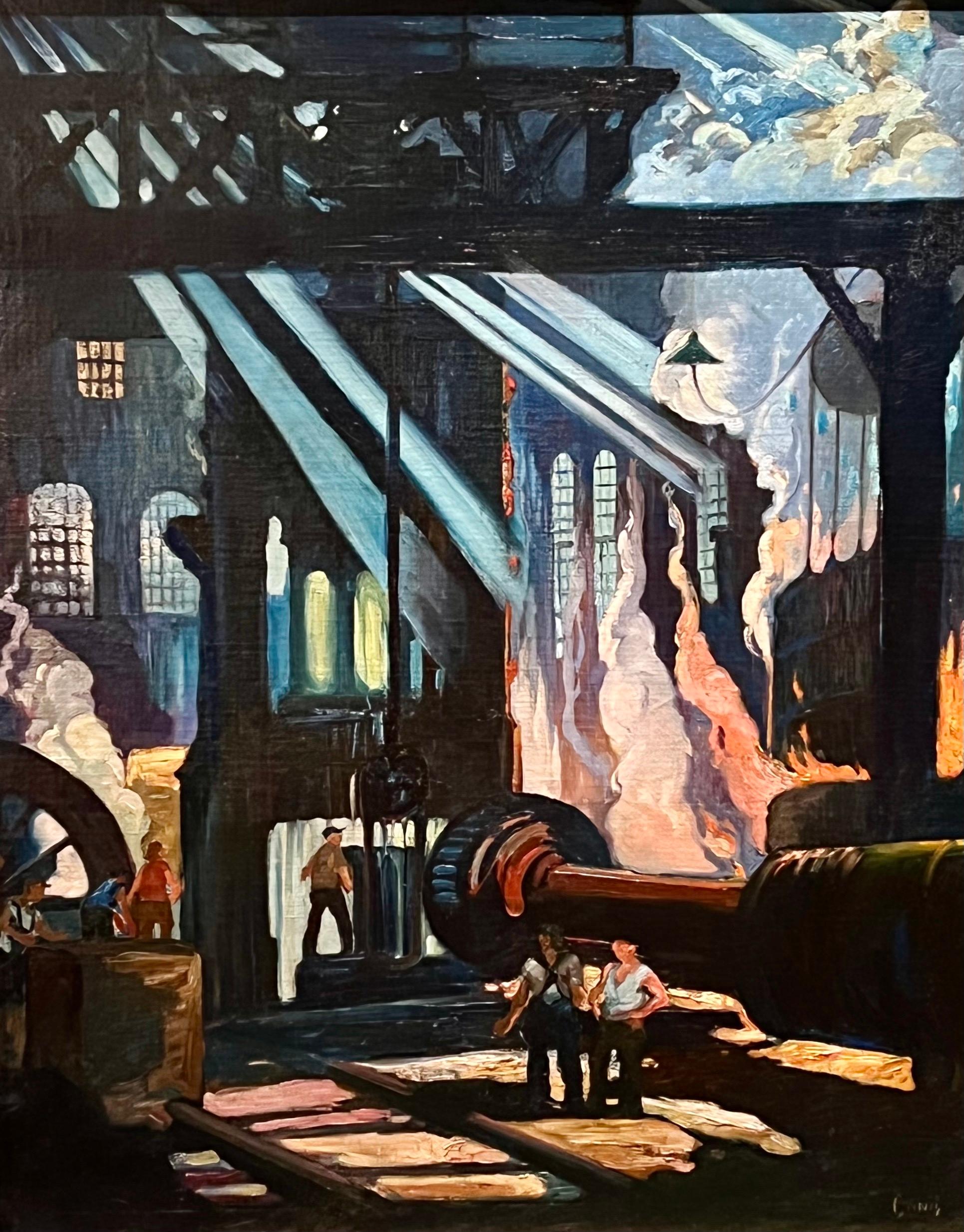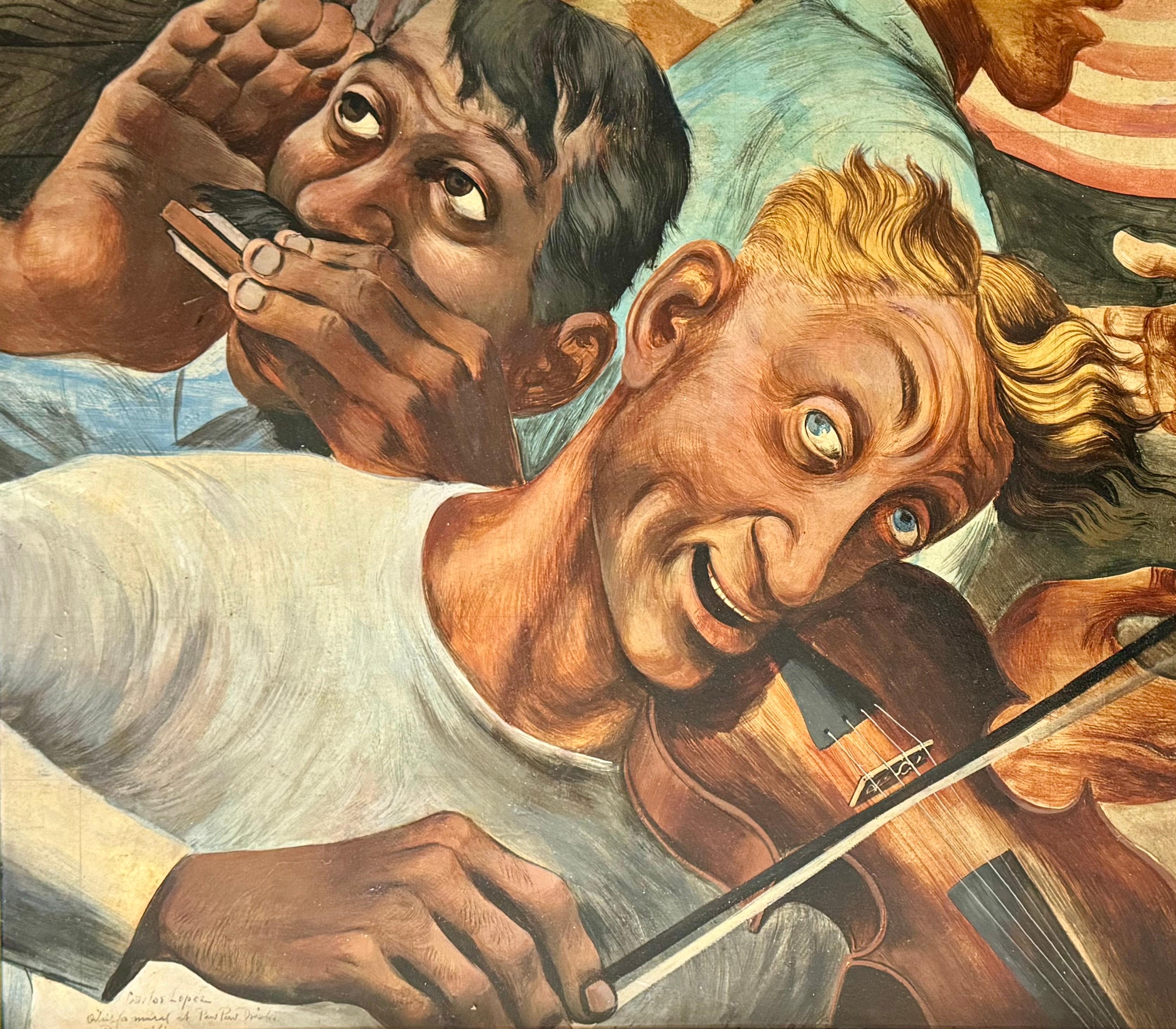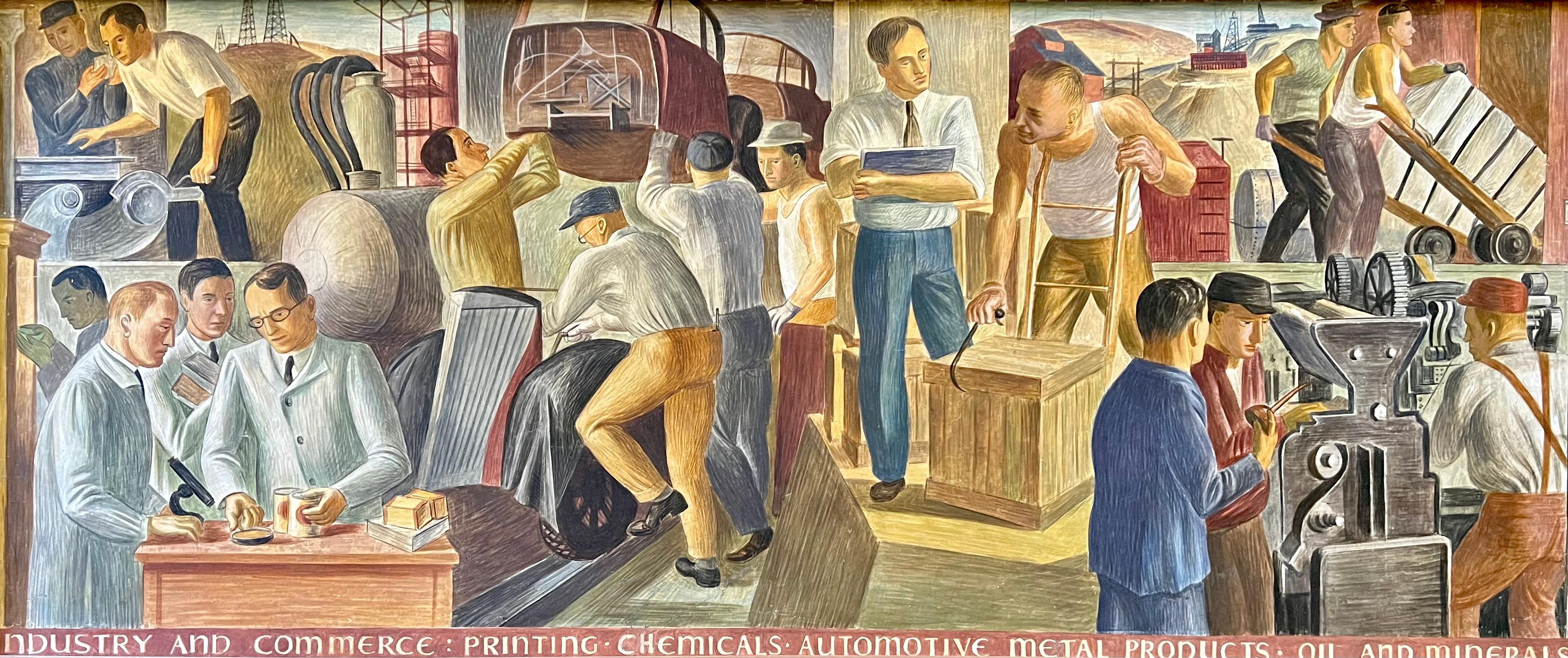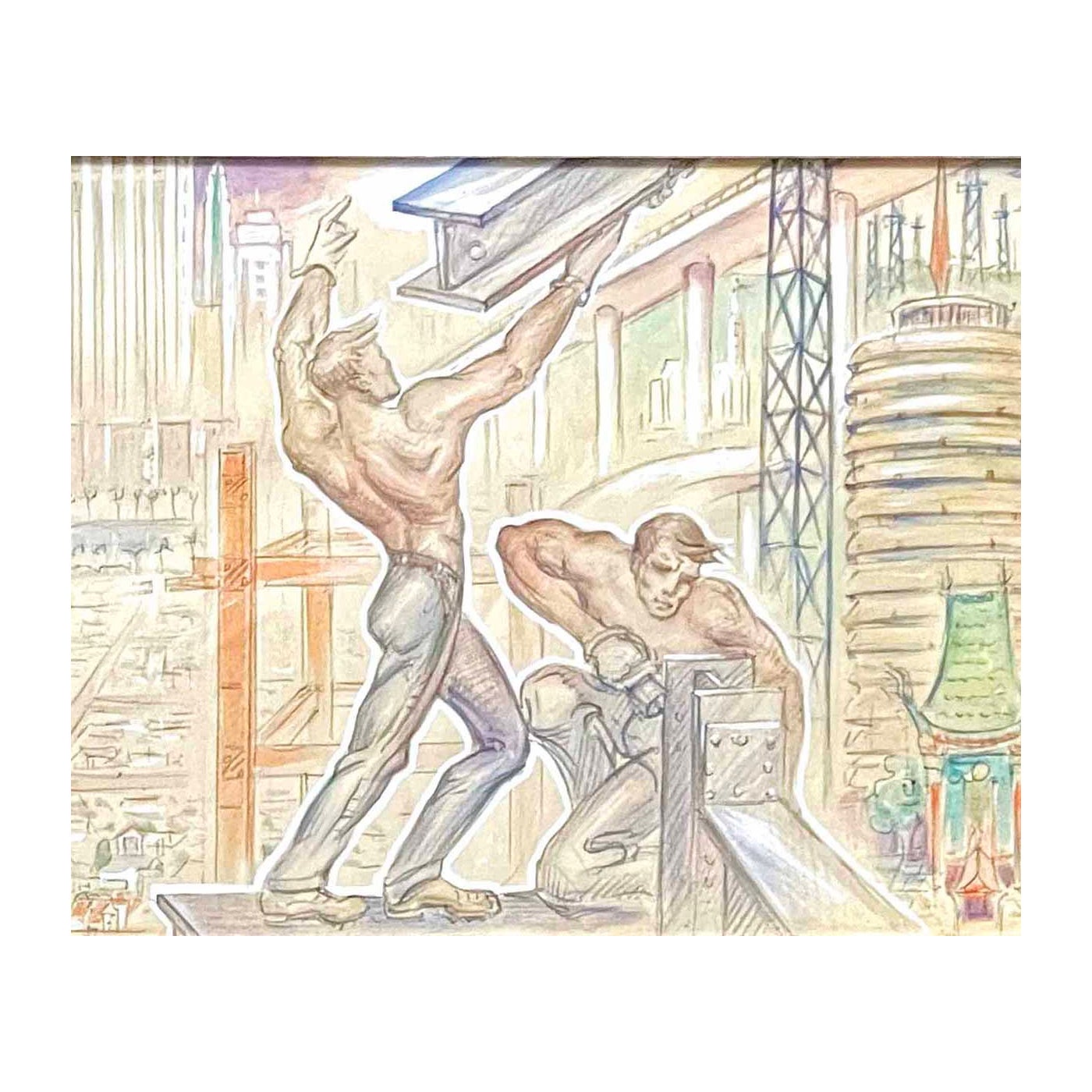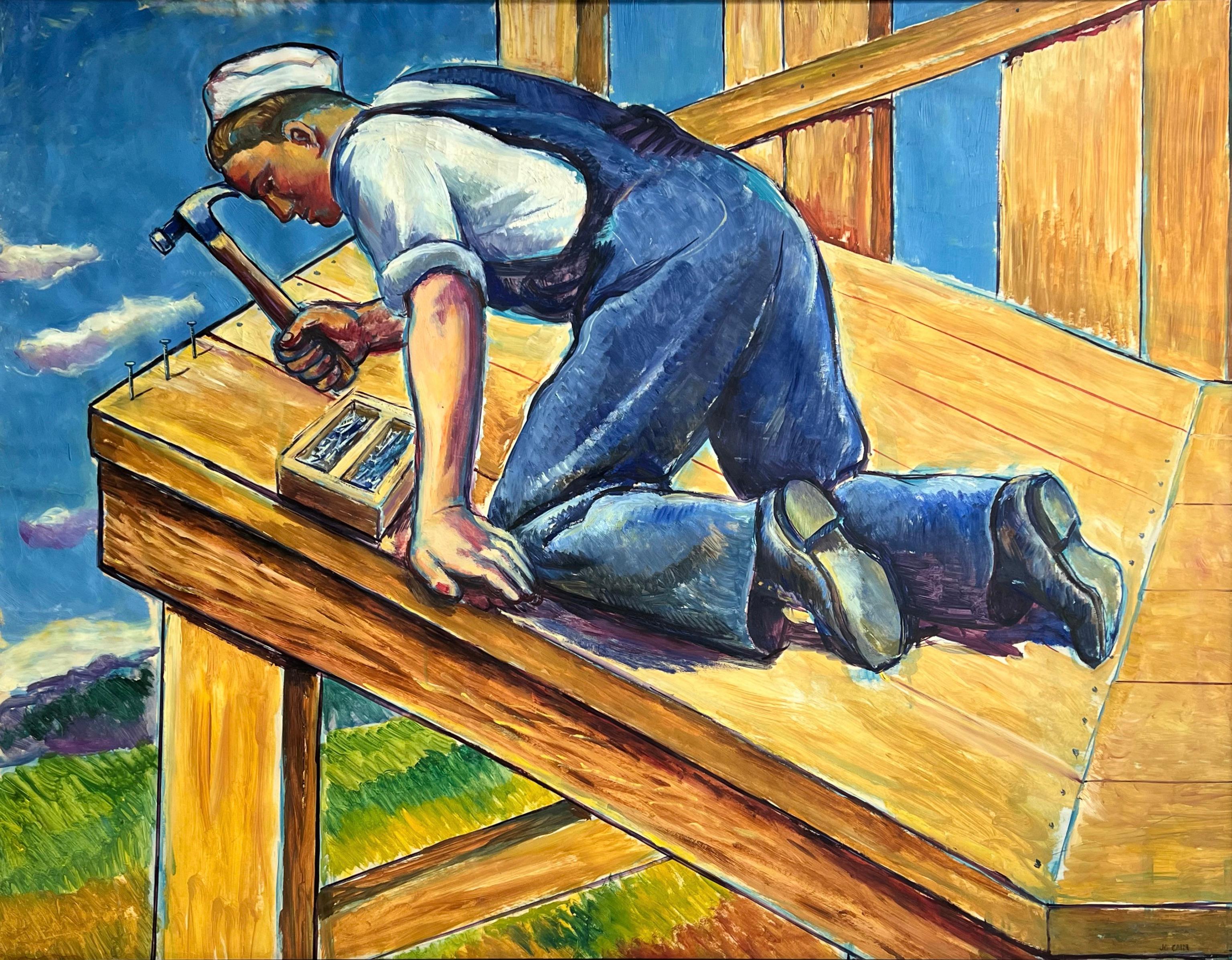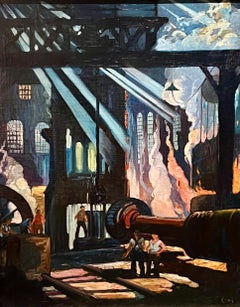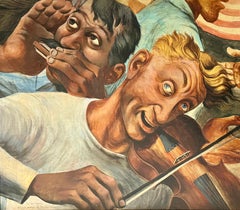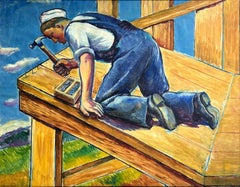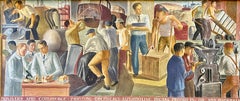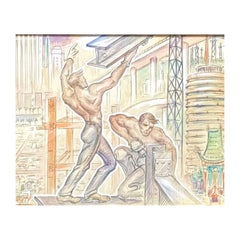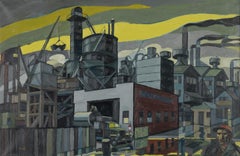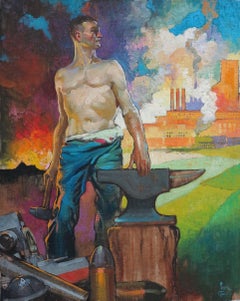Items Similar to Industrial Mural Study, Veterans Memorial Building, Santa Barbara WPA American
Want more images or videos?
Request additional images or videos from the seller
1 of 13
Joseph Edward KnowlesIndustrial Mural Study, Veterans Memorial Building, Santa Barbara WPA Americanc. 1930s
c. 1930s
$25,000
£18,881.91
€21,821.91
CA$35,066.33
A$38,997.15
CHF 20,413.21
MX$475,717.80
NOK 256,499.40
SEK 241,270.80
DKK 162,886.35
About the Item
Industrial Mural Study, Veterans Memorial Building, Santa Barbara WPA American
Joseph Edward Knowles (1907-1980)
"Study for Industry Mural, Veterans Memorial Building, Santa Barbara, CA"
19 1/2 x 50 1/2 inches
Oil on board, c. 1930s.
Estate stamp verso
Framed: 27 x 60 inches
The completed mural is currently hanging on the wall, part of the building actually, at the Veterans Memorial Building in Santa Barbara. A photo of the work insitu is included in the attached photos.
BIO
Joseph Edward Knowles was born in Kendall, Montana, on June 15, 1907. He grew up in San Diego, California. At age twenty, two years before the beginning of the Great Depression, he moved north to another town on the coast of California---Santa Barbara. There he began studying fine art at the Santa Barbara School of the Arts* (1927-1930), under the supervision of Frank Morley Fletcher, previously director of the Edinburgh College of Art. Fletcher, who was trained in portraiture, landscape painting, and woodblock* printing, was a great influence on young Knowles. It was there that Knowles learned the art of color woodblock printmaking, a medium in which he showed great skill.
Not long after completing his studies with Fletcher, Knowles began teaching art. For a period of thirty years, from 1930 to1960, he taught at the Cate School in Carpinteria, California. In 1934-1935, Knowles traveled throughout Europe, further developing his artistic skills in England, France, and Italy. Upon his return, he continued to teach art at various schools and institutions: Cate School, Crane Country School, extension classes at the University of California at Santa Barbara (UCSB), and at the Santa Barbara Museum of Art (SBMA). Knowles also served as an art education consultant for the County of Santa Barbara. In addition, he was founding co-director and president of the Santa Barbara Fine Arts Institute (1969-1972), which later developed a specialization in photography and became the Brooks Institute of Photography. Knowles died at his home in Santa Barbara on September 8, 1980.
Much of Knowles' watercolor work is associated with what has been termed the "California School*," a loose grouping of artists throughout the state that included such figures as Millard Sheets, Phil Dike, Dong Kingman, George Post, and the Santa Barbara painters Dan Lutz and Standish Backus, Jr. The California School artists, including Knowles, were known for their fresh, direct, spontaneous style of watercolor painting. Knowles and other members of the school found inspiration in nature and the built environment alike, emphasizing elements of design in their exuberant, boldly stated, colorful scenes from everyday life. While painting in a representational* manner, Knowles generally avoided photographic realism, preferring subjective interpretation of his subjects. In this, as well as in his experimental approach and vigorous brushwork, he displayed a strongly modern sensibility.
Knowles often used the wet-on-wet watercolor technique as he painted seascapes and landscapes, mostly along the California coast. He also employed dry-brush* techniques in many of his paintings, often leaving some of the white of the watercolor paper exposed. Some of the latter depict trees and other forms in a broken and airy manner that recalls Cezanne.
Knowles' colored woodblock prints are more reserved and exact in their draftsmanship than his paintings. Spare, clean, lyrical lines are drawn to illustrate floral motifs and boat scenes with a touch of asymmetry conjuring Japanese woodblock prints. His murals from the post-World War II period are considerably more modern in their approach and show an emphasis on design and color.
PROFESSIONAL ORGANIZATIONS
California Watercolor Society (1940 - 1955)
Santa Barbara Art Association (Vice President - 1952)
ONE-MAN EXHIBITIONS
Golden Gate International Exposition (GGIE) - San Francisco, California
San Diego Fine Arts Gallery (SDMA) - San Diego, California
Santa Barbara Museum of Art (SBMA) - Santa Barbara, California
Cowie Galleries - Los Angeles, California
Gallery de Silva - Santa Barbara, California
Bradley Galleries - Santa Barbara, California
MURALS
Westmont College - Ellen Porter Hall Mural - Santa Barbara, California
Safeway Grocery (now Vons Grocery on West Victoria Street) - Exterior Tile Mosaic -
Santa Barbara, California
Santa Barbara Bank & Trust - Interior Mosaic Panels, Santa Barbara, California
Santa Barbara Girls Club - Interior Mosaic Mural - Santa Barbara, California
Ernest Righetti High School - Mosaic Mural - Santa Maria, California
Shell Oil Company - Mosaic Panel - California
Beckman Instruments, Corporate Headquarters - Mosaic - Fullerton, California
STAINED GLASS WINDOWS, WALLS and PANELS
Katherine Thayer Cate Memorial Chapel - Cate School, Carpinteria, California
William S. Porter Memorial Chapel - Cottage Hospital, Santa Barbara, California
La Rinconada Building - Santa Barbara, California
ILLUSTRATIONS
"California's Wonderful Corner: True Stories for Children from the History of the Santa Barbara Region," by Walter A. Tompkins (1962 & 1975)
China Designs:
Two sets of dinnerware for Winfield China, Inc., Santa Monica, CA
PERMANENT COLLECTIONS
Denver Art Museum - Denver, Colorado
Santa Barbara Museum of Art (SBMA) - Santa Barbara, California
San Diego Fine Arts Gallery (SDMA) - San Diego, California
- Creator:Joseph Edward Knowles (1907 - 1980, American)
- Creation Year:c. 1930s
- Dimensions:Height: 27 in (68.58 cm)Width: 60 in (152.4 cm)
- Medium:
- Movement & Style:
- Period:
- Condition:
- Gallery Location:New York, NY
- Reference Number:1stDibs: LU1156216162032
About the Seller
5.0
Gold Seller
Premium sellers maintaining a 4.3+ rating and 24-hour response times
Established in 2008
1stDibs seller since 2019
195 sales on 1stDibs
Typical response time: <1 hour
- ShippingRetrieving quote...Shipping from: Pawling, NY
- Return Policy
Authenticity Guarantee
In the unlikely event there’s an issue with an item’s authenticity, contact us within 1 year for a full refund. DetailsMoney-Back Guarantee
If your item is not as described, is damaged in transit, or does not arrive, contact us within 7 days for a full refund. Details24-Hour Cancellation
You have a 24-hour grace period in which to reconsider your purchase, with no questions asked.Vetted Professional Sellers
Our world-class sellers must adhere to strict standards for service and quality, maintaining the integrity of our listings.Price-Match Guarantee
If you find that a seller listed the same item for a lower price elsewhere, we’ll match it.Trusted Global Delivery
Our best-in-class carrier network provides specialized shipping options worldwide, including custom delivery.More From This Seller
View AllIndustrial Mid-20th Century WPA Modern Men Working American Scene Social Realism
Located in New York, NY
Industrial Mid-20th Century WPA Modern Men Working American Scene Social Realism
George Pearse Ennis (American, 1884-1936)
"Forging a Gun Tube #1...
Category
1910s American Modern Interior Paintings
Materials
Canvas, Oil
Post Office WPA Mural Study American Scene Social Realism Modern 20th Century
By Carlos Lopez
Located in New York, NY
Post Office WPA Mural Study American Scene Social Realism Modern 20th Century
Carlos Lopez (1910-1953)
"Bounty" WPA Mural Study for Michigan Post Office
19 ½ x 22 ½ inches
Oil on B...
Category
1940s American Realist Figurative Paintings
Materials
Oil, Board
WPA Post Office Mural Study American Scene Regionalism Social Realism
By Louise Ronnebeck
Located in New York, NY
WPA Post Office Mural Study American Scene Regionalism Social Realism
Louise Emerson Ronnebeck (1901 - 1980)
Oil Riggers, Mural Study
Image: 6 1/2 x 37 inches
Watercolor and egg tem...
Category
1930s American Modern Figurative Drawings and Watercolors
Materials
Paper, Watercolor, Cardboard
Industrial Man Working Mid 20th Century American Scene Social Realism Modern WPA
By Jo Cain
Located in New York, NY
Industrial Man Working Mid 20th Century American Scene Social Realism Modern WPA
Jo Cain (1904 - 2003)
Hammering Nails
39 x 50 ½ inches
Gouache on paper c. 19...
Category
1930s American Realist Figurative Drawings and Watercolors
Materials
Paper, Gouache
WPA Mural Study 1940 American Scene Modern Social Realism Figurative Mid Century
By Michael Loew
Located in New York, NY
WPA Mural Study 1940 American Scene Modern Social Realism Figurative Mid Century
Michael Loew (1907-1985)
Detail for Mural (Social Security Building Washington D.C.)
24 x 24 inches ...
Category
1940s American Realist Figurative Paintings
Materials
Canvas, Oil
"Good Health Week" WPA American Scene Mid 20th Century Modern Social Realism
By Jo Cain
Located in New York, NY
"Good Health Week" WPA American Scene Mid 20th Century Modern Social Realism
Jo Cain (1904 – 2003)
Good Health Week
10 ½ x 15 1/2 inches
Oil on pape...
Category
1940s American Realist Figurative Drawings and Watercolors
Materials
Paper, Oil
You May Also Like
Industry and Commerce
Located in Los Angeles, CA
This mural study is part of our exhibition America Coast to Coast: Artists of the 1930s
Industry and Commerce, 1936, tempera on panel, 16 ½ x 39 ½ inches, signed verso “John Ballator, Portland Ore.” provenance includes: J.C. Penney Company, represented by Russell Tether Fine Arts Assoc.; presented in a newer wood frame
About the Painting
Industry and Commerce is a prime example of WPA Era muralism. Like a Mediaeval alter, this mural study is filled with icons, but the images of saints and martyrs are replaced with symbols of America's gospel of prosperity through capitalism. Industry and Commerce has a strong narrative quality with vignettes filling the entire surface. Extraction, logistics, design, power generation, and manufacturing for printing, chemicals, automobiles and metal products are all represented. To eliminate any doubt about the mural's themes, Ballator letters a description into the bottom of the study. Ballator also presents an idealized version of industrial cooperation, as his workers, lab-coated technicians and tie-wearing managers work harmoniously toward a common goal in the tidy and neatly designed environments. Although far from the reality of most industrial spaces, Ballator's study reflects the idealized and morale boosting tone that many mural projects adopted during the Great Depression.
About the Artist
John R Ballator achieved success as a muralist, lithographer, and teacher during the Great Depression. Born in Oregon, he studied at the Portland Museum Art School, the University of Oregon and at Yale University where he received a Bachelor of Fine Art. In 1936, Ballator was commissioned to paint a mural panel for the new Department of Justice Building in Washington DC, an important project that spanned five years with several dozen artists contributing a total of sixty-eight designs. Ballator completed murals for the St. Johns Post Office and Franklin High School, both in Portland, Oregon. He also contributed to the 1938 murals at Nathan Hale School in New Haven, Connecticut. During the late 1930s, Ballator taught art for several years at Washburn College in Topeka, Kanas, where he completed a mural for the Menninger Arts & Craft Shop before accepting a professorship at Hollins College...
Category
1930s American Realist Figurative Paintings
Materials
Tempera
"The History of Los Angeles", Important Art Deco Mural Study w/ Major Landmarks
By Alexander Rosenfeld
Located in Philadelphia, PA
A late entry in America's string of public murals painted in the 1930s, 40s and 50s telling the story of various towns and regions, this 1962 Art Deco study b...
Category
Vintage 1960s American Art Deco Paintings
Materials
Paint
$7,000 Sale Price
20% Off
"Colonial Sand and Stone Company, New York, " Industrial WPA Scene, Precisionist
By William Sharp
Located in New York, NY
William Sharp (1900 - 1961)
Factory on the River
Oil on canvas
20 1/2 x 28 1/2 inches
Initialed lower left: WS
Provenance:
Estate of the artist
Private Collection, New York
Swann Auction Galleries, American Art, June 13, 2019, Lot 178
Private Collection, New York
Colonial Sand and Stone Co., founded by Generoso Pope, was once the country’s largest sand and gravel business, providing the concrete for much of New York City’s skyline, including the Empire State Building, Rockefeller Center, Radio City Music Hall, airports and subways.
William Sharp was born on June 13, 1900, in Lemberg, Austria, where he attended college and the Academy for Arts and Industry. He later studied in Kraków, Poland, and in Berlin and Munich, Germany. Sharp began his career as a designer of stained-glass windows and as a painter of murals. He served in the German army during World War I. After the war he became a newspaper artist in Berlin and a well-known etcher.
Sharp drew political cartoons that were bitterly critical of the growing Nazi movement. As the influence of National Socialism intensified, he began to contribute drawings, under a pseudonym, to publications that were hostile to Hitler. After Hitler assumed power, Sharp was confronted with these drawings and told that he would be sent to a concentration camp. However, in 1934, he escaped to the United States.
His first newspaper assignment in America was making courtroom sketches for The New York Mirror...
Category
Mid-20th Century American Realist Landscape Paintings
Materials
Canvas, Paint, Oil
Allegory of Defense Industry (figurative male illustration)
By Frank Godwin
Located in Wilton Manors, FL
Frank Godwin (1889-1959). Allegory of Defense Industry, 1919. Oil on canvas. Signed lower right. Image measures 20.75 x 26.25 inches. The canvas measures 24 x 36 inches in total. Ann...
Category
Early 20th Century American Realist Figurative Paintings
Materials
Canvas, Oil
$12,000 Sale Price
40% Off
"Commerce and Industry", Beaux Arts/Art Deco Allegorical Mural w/ Male Nudes
Located in Philadelphia, PA
A fabulous example of allegorical mural painting, this large piece by Edward Holslag features a central winged figure holding a reflective orb, flanked ...
Category
Vintage 1920s American Beaux Arts Paintings
Materials
Paint
$20,000 Sale Price
20% Off
Factory Worker
Located in Los Angeles, CA
This painting is part of our exhibition America Coast to Coast: Artists of the 1930s
Factory Worker, c. 1936, oil on canvas, signed lower right, 18 ¼ x 36 inches; exhibited in City ...
Category
1930s American Realist Figurative Paintings
Materials
Oil
More Ways To Browse
Industrial Art Photos
American Woodblock
Used Industrial Windows
Mosaic Scene
Vintage Santa Wall Art
Golden Gate Painting
1930s Industrial Painting
Japanese Stained Glass
Frank Golden Painting
1930 Floral Painting
Nature Woodblock
Oil Paintings By C Walters
Japanese Tile
Oil Paintings Cranes
1930s Wpa Prints
Joseph Banks
Chinese Art Tiles
Tree Woodblock
